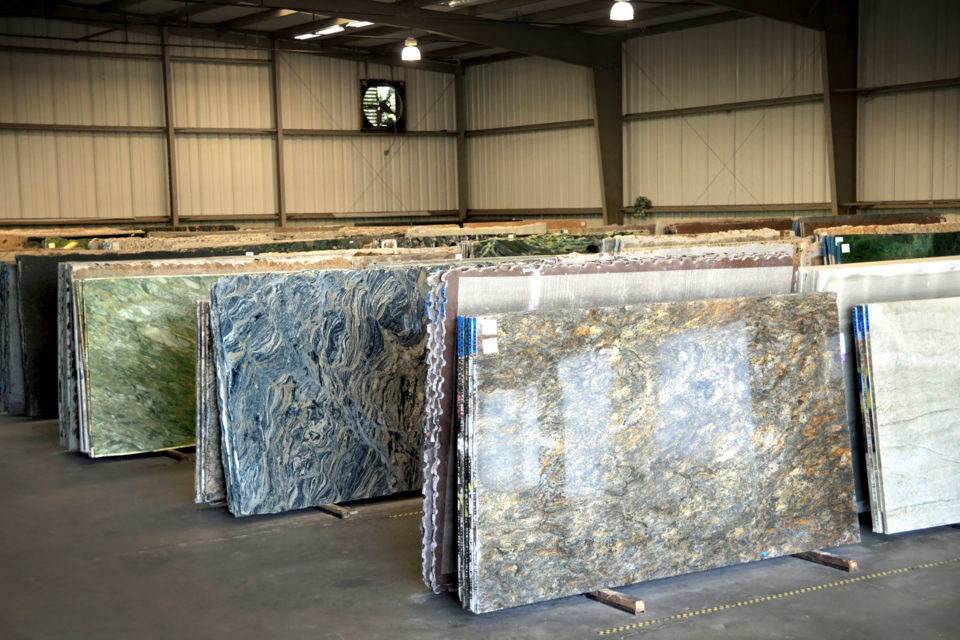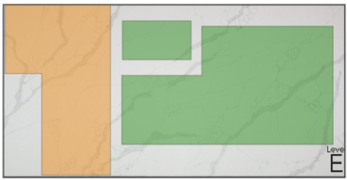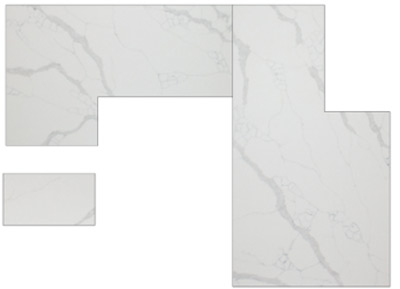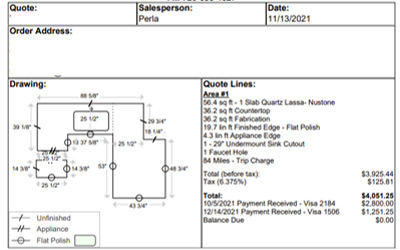We help you find the perfect slab at one of the Denver Metro importers.
Concerned about staining, etching, or scratching your new countertops? We will help you select the best material for your project.
Download our Customer Guide to learn how Cornerstone Granite will help you get the perfect countertops!
| Granite | Quartz (Engineered Stone) |
Quartzite | Marble | |
| Stain Resistance | Good 1 | Good | Varies | Poor |
| Wear Resistance | Good | Good | Good | Poor |
| Heat Resistance | Excellent | ~300°F 2 | Excellent | Good |
| 1 Requires annual sealing 2 Varies by manufacturer | ||||
As they are quarried natural stones vary in appearance and color creating a one-of-a-kind countertop.
Quartz does not require annual sealing and provides colors not available in granite (white, concrete…)
The quote process
We bid the job based on the material and labor required for your project.

Step 1 – Measure
Each slab is a different size and price. We search the inventory of local importers to find your best options.
Based on our laser measurements, we determine how much slab your countertops require.

Step 2 – Create Layout

We create a layout to determine how many slabs/seams are required for your project.
Slabs & Seams

Step 3 – Detailed Bid

We then provide a detailed bid based on raw material and finished countertop fabrication.
Are quartz and granite right for your remodel?
There are thousands of choices of natural stone available for consumers wishing to put a personal touch on their home’s countertops, fireplaces, showers and thresholds, and thousands more choices of engineered materials.Each natural stone slab will be unique, even within the same bundle, providing infinite options for personalization.
In addition to a distinct appearance, each stone possesses different qualities, unique to the makeup of that slab, providing different benefits for different applications. Below we have provided a list of the most commonly used materials and each product’s unique characteristics.
Most Common Materials
Granite – Long the top choice for homeowners, this natural stone product offers thousands of different colors and patterns and can vary substantially in price. Granite surfaces may contain inclusions and fissures in the stone which often create the beautiful patterns and movement that make each piece unique. Granite may be susceptible staining and etching depending on the nature of the particular piece in question and should be sealed regularly and cleaned quickly following any spills.
Marble – Marble has been a popular choice for all types of surfaces for thousands of years and remains very popular today for its natural beauty and elegance. Marble is a porous material meaning that it can stain more easily than other natural stones and is therefore not ideal for kitchen applications where it is likely to come in contact with acidic, oily or brightly colored liquids and food products.
Quartz – Quartz generally refers to an engineered stone surface designed to be maintenance free. Quartz countertops resist stains, scratching, impacts and heat due in large part to their non-porous surface. Increasingly popular, many Quartz manufacturers have continued to expand their line of colors and designs and offer many products which are designed to mimic the appearance of fine marbles and high-end natural stone products.
Quartzite – This product should not be confused with “Quartz”- which describes a popular engineered (man-made) counter top product made from crushed quartz and resins. Quartzite is a naturally occurring stone very similar to granite in its properties to resist staining. Quartzite is formed primarily from quartz and sandstone combined at very high heat and pressure. As a result, Quartzite will typically be harder than most types of granite. Additionally, the higher percentage of quartz present in the stone will give it a more crystallized appearance than most granites.
Additional Materials
Recycled Countertops – Designed to be an eco-friendly choice, recycled countertops are often made in part of a variety of recycled materials including glass, plastic, composite or concrete. Because these countertops are often made of pieces of recycled glass or plastic scattered through another medium, they are not ideal for complex edges as the small pieces may dislodge, leaving pocks and holes along the edge.
Slate – Slate can come in a variety of colors and has a very natural organic appearance. It is often used for floors, fireplaces and entries.
Soapstone – A non-porous material that does not need to be sealed the way many other natural products do. It is however commonly treated with mineral oil, which will darken the stone’s appearance and may deepen its tone and patina over time. Color choices are limited to various shades of gray with green with blue and white veining commonly appearing in the stone. Soapstone is very popular in kitchens, barbecue areas and fireplace hearths due its anti-bacterial and thermal properties which allow it to conduct heat better than other stones.
Travertine – A form of limestone, travertine is deposited by mineral springs, often hot springs, and comes in various shades of white, cream and brown. Travertine is a classic Italian building material, is most commonly used in flooring applications and will often have a rough-hewn or pocked appearance.
